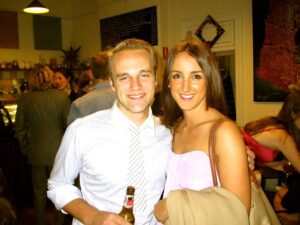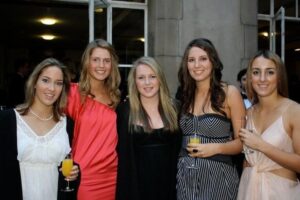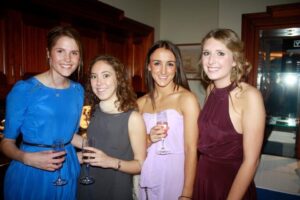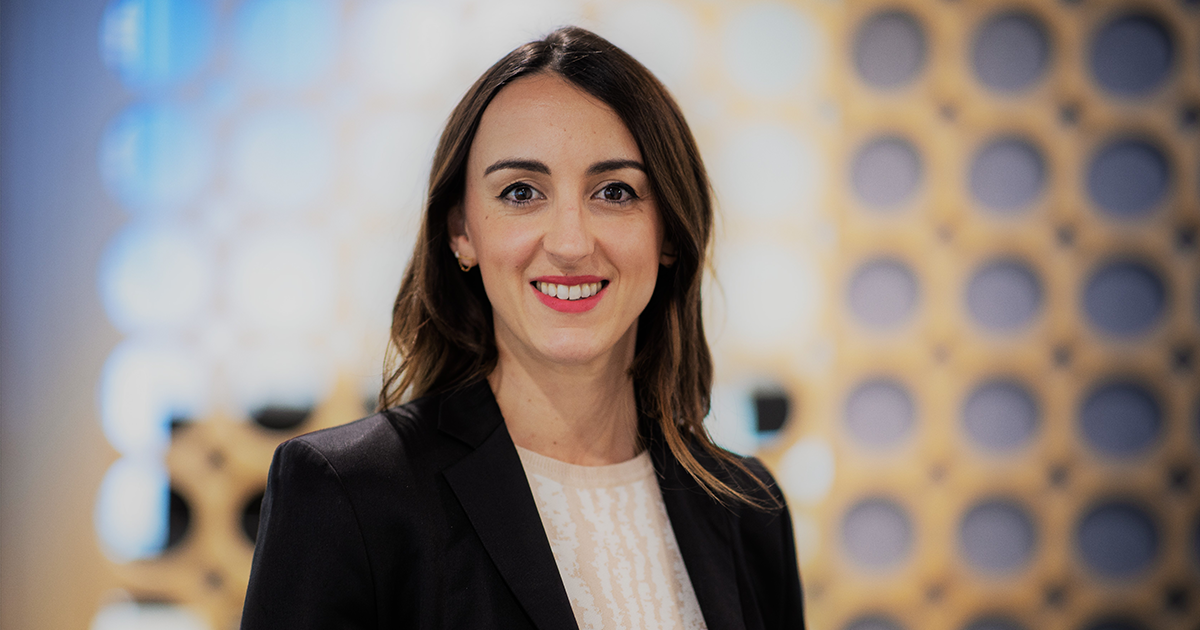Jennifer joined St Andrew’s College in 2008 and since graduating has worked in a number of different positions within the public sector, including as a Senior Advisor in the Department of the Prime Minister and Cabinet. In 2021, she was awarded the Sir Roland Wilson Scholarship which has allowed her to undertake her PhD full-time at the Australian National University.

Please tell us a bit more about yourself – where are you originally from and where did you grow up?
I grew up in the beautiful Kangaroo Valley on the New South Wales South Coast. I have very fond memories of the community there and all the wonderful activities from my childhood, like tennis, touch football, bush walking, and events like the annual show. I attended Bomaderry High School in Nowra, which provided a fantastic educational experience for kids from local communities in the area. After school, I took a year off to work full-time in hospitality and travel to Spain, the UK, and Canada before commencing university.
What were your favourite memories and what parts of College life were you involved in?
My college experience at St Andrew’s was a very formative part of my university life and early years of adulthood. I loved the strong sense of community among Androvians and the opportunity to connect with others with similar interests and passions. I enjoyed being involved in sporting teams, including hockey and tennis, and making use of academic tutoring programs to support my university studies. My favourite memories were those everyday moments, like chatting over lunch and studying together in the college libraries, as well as some bigger highlights like celebrations over winning the Rose Bowl Cup.
Why did you choose to reside at St Andrew’s College?
Coming from a small community, and having spent time away overseas, I knew that I wanted to start my university experience in a new city feeling as supported as possible. St Andrew’s offered an incredible opportunity to instantly connect with a diverse range of fellow students. I was also attracted to all the extracurricular opportunities on offer, including sport, music, and academic programs, as well as all the fun social events!
How did you see the College change for women whilst you were there? And have you noticed any changes since?
By the time I commenced at St Andrew’s, women had been living there for almost a decade. Women were as integral to the fabric of the College as any of the male residents, which was reflected in female appointments to key student leadership roles. The successes of St Andrew’s women were celebrated just like the male residents. But there was still some necessary cultural change underway to improve some historic informal traditions to ensure they reflected the contemporary values of the College. There were many positive steps taken in my time there, which I know have continued since I left.
Since leaving College you have had several different roles in the Public Sector. Could you please describe your career path to date?
Throughout my studies in International Relations, Geography, and Languages, I was passionate about pursuing a career in the public service. Following university, I undertook a Graduate Program in the Department of Defence in Canberra, where I had the chance to work in several roles including supporting Australia’s defence engagement with Afghanistan and Pakistan, deploying as a policy adviser on a major Australia-United States exercise in Queensland, and assisting with project management for complex ICT projects. Following my training, I then worked as an analyst on Air Force capability projects, before moving into international policy to help manage defence cooperation with China and South Korea. At that stage in my career, I was ready to broaden my public service experience, so moved into the Department of the Prime Minister and Cabinet (PM&C) to support coordination of policy proposals for the National Security Committee of Cabinet. I then held a range of roles in PM&C, including as a counter-terrorism adviser, working for a Cabinet Secretary in the Prime Minister’s Office, and most recently as a Senior Adviser on national security issues.
You spent time working as a Senior Adviser in the Department of the Prime Minister and Cabinet. Could you tell us what your role involved? And what the most rewarding and challenging aspects of the job were?
As a Senior Adviser in PM&C, I was responsible for providing policy advice to the Prime Minister on issues within my area of responsibility, which included counter foreign interference and critical infrastructure security. A regular day could involve drafting advice ahead of Cabinet deliberations, writing media statements and talking points in response to fast moving events, or identifying emerging issues and suggesting possible courses of action. This also required close coordination with colleagues across PM&C to ensure the economic and social, as well as the security implications of issues, were fully addressed. An important part of my role was working with officers across the national security community, and other relevant government agencies, to support the proper implementation of government decisions and priorities.
It was an absolute privilege to work at the centre of government on the most pressing national security challenges of the day. The most rewarding part of the role was seeing the impact of your advice on decision-making processes to support better outcomes for our country. The most challenging aspects of the job were quickly getting across and developing advice on very complex policy problems, for which there were no easy answers. Most of the issues that I was responsible for did not have precedent for how the government should respond, so they required novel solutions and constant adaptation to achieve the desired outcomes. That also made it an interesting and exciting part of the role!
You previously undertook a Masters in National Security Policy at ANU and are now completing your PhD. Could you tell us why you decided to undertake further study? And what your research focuses on?
After commencing in the public service, I wanted to gain more specialised knowledge of Australian national security policymaking processes and issues. The Master of National Security Policy at the ANU National Security College offered an unparalleled opportunity to gain such expertise, including from former senior practitioners, and have the chance to practice policymaking skills necessary for a long-term career in the public service. I was very fortunate that Defence and then PM&C helped support my studies while working full time. After completing my studies, I have been fortunate to be able to draw on the subject matter knowledge and the professional networks from that degree throughout my career.
I always knew that I wanted to undertake deeper research following my master’s degree. After almost ten years of public service in a wide range of roles, I felt like I had reached the right point to start to specialise in a subject matter area that I was both passionate about and which had public policy significance. That is what led me to apply for the Sir Roland Wilson Scholarship, which I was awarded at the start of 2021. The Sir Roland Wilson Foundation and PM&C support me to undertake full-time PhD research for three years. My research examines how United States allies are responding to US-China competition over advanced technologies. Having just completed my first year, I am about to commence deep case study research and plan to travel to North America and Europe for interviews over the coming year.
What do you like to do outside of work?
I like to stay active through lots of different activities, like running, swimming, and tennis. Canberra is a great place to get involved in social sport and there are also lots of beautiful nature reserves and national parks to explore, especially if you like bird watching. I also love cooking anything from Ottolenghi’s cookbooks and enjoying all the fantastic restaurants and bars in Canberra. It has been a while since I have had the chance to travel overseas due to the pandemic, but I also like visiting countries a bit off the beaten track.
What are you listening to at the moment that you’d recommend?
I am a regular listener of the Sinica Podcast hosted by Kaiser Kuo which discusses current affairs in China. While there is so much China-related analysis available these days, I find Sinica a cut above because of the expertise of the guests and the way Kaiser unpacks the issues and provides useful frameworks for thinking about a country as complex as China.
Do you have any advice for young Androvians looking to start a career in the public sector?
Working in the public service is a real privilege, and I would encourage anyone to consider a role in government at some stage in their career. Roles in public service agencies are as diverse as the communities they serve, from accountants, to engineers, to diplomats. So, government needs people of all types of backgrounds and skillsets and there is no one model for gaining entry to, or succeeding in, the public service. I would encourage interested Androvians to pursue their interests and passions, and there will inevitably be a part of the public service where your talents are in high demand! I would also encourage you to keep an open mind about applying for a range of agencies and organisations, as once you are in a public service role, you will find it is much easier to move into other areas. Gaining a broad appreciation of different roles and functions in government will also set you up for success and senior leadership roles down the track.




